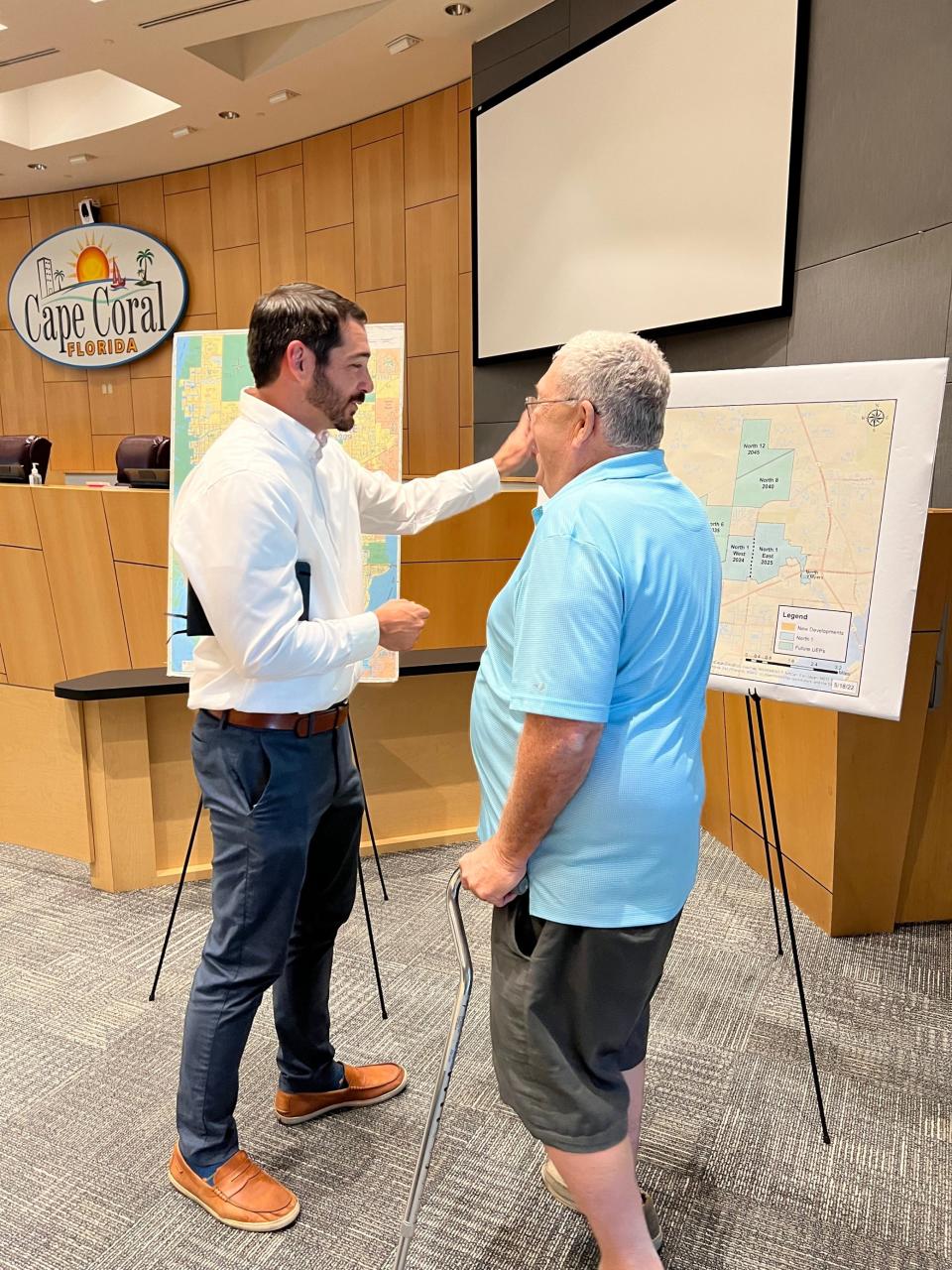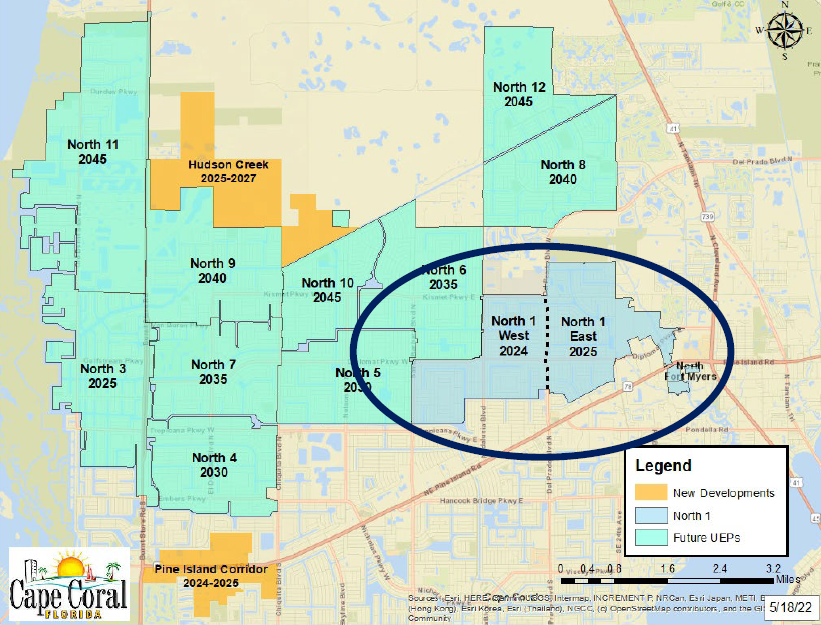Cape Coral utility expansion worries residents
Cape Coral residents recently packed into the first floor of city hall, nervously chattering with terms like refinancing and reverse mortgages escaping their lips as they waited for the informational meeting on the Utilities Extension Project (UEP) to start.
City officials answered pressing questions on the project, cost to homeowners, payment, and other things northeast residents should expect, with the focus on affording a $30,000-plus bill.
The UEP provides water, sewer, and irrigation services in phases to replace septic and shallow groundwater wells and connect households to the city's potable water treatment and distribution facilities.
The funding will mostly be put up by property owners through special assessments, which the city can collect to fund capital improvements and municipal services.
"Can the city do anything?" Gary Orciani, 71, told the News-Press. He was among 145 people who attended the forum Wednesday.
"I think everyone wants to know that," his wife, Christine Orciani, 64, added.
The Orcianis bought a house in Cape Coral in 2007 and like many residents living in the boundaries of the North 1, would struggle with paying the full cost of the UEP assessment.

They began slowly living most of their time in the city as they wind down their business in Massachusetts.
"We haven't quite moved all the way down yet, we still have stuff at home that we have to take care of," Christine Orciani said.
But those plans have been complicated because they may need to sell and move out of the area if the UEP assessment can't go down.
"We built our house, there was nothing, we never heard anything about it until years later when the city would (expand utilities) in different areas, and they weren't even sure it was gonna come up our way," Christine Orciani said. "We have friends who live in the southwest who paid $18,000, so it's like we're double that."
Previous coverageHow much will Cape Coral's utilities extension cost you?
Past UEP costHow much will Cape Coral's utilities extension cost you?
Recent Cape newsCape Coral's 12th annual Catch The Vision returns after Hurricane Ian delay
UEP costs vary, but start about $33,000
The line extension assessment and capital facility expansion charge cost to property owners varies on the size of their respective parcels, with a 10,000-square-foot lot estimated between $33,367 to $35,931, and the payment plan the homeowner chooses.
Connection costs are not included in the estimates, but meter installation fees are currently $310, and a septic abandonment permit fee is $100.
A community development block grant is available for low-income families to connect from the meter to the home, septic abandonment fee, and water meter fee.
Taxpayers in the area can expect their first bill in November 2024 and can choose to be billed annually for 20, 25, or 30 years.
The default method, 30 years, will result in a parcel paying $3,740 annually.

Expanded utilities critical to growth, water safety
Councilmember Tom Hayden said the assessments are heavy, but the city had to move forward with installing utilities.
"We know that people are going to be concerned about the cost," Hayden said. "They are as high as they've ever been, but it's important for us to continue to move through with the project and bring utilities to this location."
Cape Coral was developed as a low-density, rural community with septic tanks and shallow groundwater wells to provide water to residents.
The city's population has grown from 154,305 in 2010 to 204,510 now, as the population swells to have more than 430,000 residents by 2070.
Still, with the massive population growth, the city seeks to ease away the reliance on old systems for fear of wells drying and septic tank discharge entering the groundwater and canals.
"It is not only important for the environment, but it's also important for any new development that may be coming up to the Cape as well," Hayden added.
Other residents such as Shelley Oliver, a five-year resident, said she's baffled by the timing because she's still trying to figure out how to prepare her roof that was damaged by Hurricane Ian in September.
"A lot of people here are still struggling, there's a lot of blue roofs in case they haven't looked around," Oliver said.
Hayden said the timing is unfortunate, but the city is following its schedule but ensuring enough time for residents to prepare themselves in whatever way possible.
"These assessments really won't show up on their tax rolls until 2024, there's time to pay, and there's still time to recover from the storm," Hayden said.
He added that the city is still looking for grants and ways to help these residents save on costs.
A hardship program is available to those based upon income qualification, which they must qualify for annually.
For subscribers Could Cape Coral's Chiquita Boat Lock be removed?
South Cape development Cape Coral $100M Bimini basin project advances; work expected this summer
Cape canal controversy Residents troubled by Cape Coral canal clean up; FWC follows up
What's next for Cape residents?
When the construction is complete and the utilities have passed inspection, homeowners will receive a letter from the city that they must connect to the new system within 180 days.
By 2045, the entire city should have water, sewer, and irrigation.
On October 2021, the city council approved a split for the North 1 UEP areas into Del Prado West and Del Prado East.
North 1 West UEP design is complete with bids for the first four contracts out of six received in November 2022, and the east design is 75% completed, with the city projecting bidding for the five contracts by the end of this year.
North 1 East UEP construction will then follow with an approximate 2-year construction period and anticipated completion by the end of 2025.
The first of two final public hearings for the UEP resolution will be on March 22.
This article originally appeared on Fort Myers News-Press: Cape Coral utility meeting leaves residents with concerns

